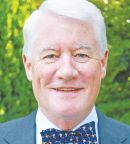
John F. Smyth, MD
THE UNIVERSITY of Edinburgh Medical School was established in 1726 during the Scottish Enlightenment. As one of the oldest medical schools in the English-speaking world, it is interesting to reflect on the seminal contributions made centuries ago by several alumni that are still relevant to the practice of medicine today.
Three Famous Alumni
Within walking distance of my office in the center of the city, three famous alumni discovered and developed anesthesia, antisepsis, and antibiotics! Sir James Young Simpson (1811– 1870), Professor of Medicine and Midwifery, was the first to experiment with chloroform in humans (initially trying it on himself), and in 1847, he launched the concept of anesthesia.
Joseph Lister (1827–1912) trained as a surgeon in Edinburgh and, from 1869 to 1881, was our senior Professor of Surgery. Based on the work of Louis Pasteur, Lister developed his interest in the use of chemical solutions to treat and prevent sepsis. In 1867, he published in The Lancet the first paper demonstrating the use of carbolic acid and founded the concept of “antisepsis in surgical technique.”
Sir Alexander Fleming (1881–1955) was the Rector of Edinburgh University, whose principal responsibility it was to Chair the Court—the University’s governing body. Fleming was born in Scotland but trained in medicine at St. Mary’s Medical School in London, where he qualified with distinction in 1908.
He lectured there until the onset of World War I, during which he worked on battlefields on the Western Front. Appalled by his helplessness while observing thousands of men dying from wound infections, this feeling influenced his subsequent choice for research when he returned to St. Mary’s Hospital.
Brilliant Observations
FLEMING WAS by all accounts somewhat disorganized, and his laboratory was often described as “a complete mess,” but accidental contamination of two bacterial cultures led to two remarkable discoveries—lysozyme and penicillin. He may have been disorganized, but he was an acute observer and reflected brilliantly on his observations—lessons for all of us!
In 1921, he identified a weak antibacterial enzyme in tears and mucous fluids. Accidental contamination of a culture of nasal mucus by a previously undescribed organism proved highly sensitive to the lytic action of this enzyme, which he named lysozyme. The bacterial colonies dissolved, and he recognized that the enzyme was part of the body’s natural defense system against bacteria.
“[Alexander Fleming] may have been disorganized, but he was an acute observer and reflected brilliantly on his observations— lessons for all of us!”— John F. Smyth, MD
Tweet this quote
The term “chemotherapy” was coined early in the 20th century, after modest success was seen in the treatment of syphilis with arsenic compounds. In the 1930s, sulfonamides were developed for streptococcal infections such as puerperal fever, pneumococcal infections, and gonorrhea, all compounds that were bacteriostatic.
It was the work of Louis Pasteur that encouraged Fleming to pursue biologic agents (as distinct from chemical agents) to destroy bacteria. He believed that once infection arose, it was the body’s own mechanisms that would have to contain it. Wouldn’t he have loved the idea of checkpoint inhibitors and the story of programmed cell death ligand 1 (PD-L1)!
Famous Discovery
IN 1928, Fleming was working on staphylococci. On returning from a vacation, he was about to discard some forgotten bacterial culture plates that had been overrun with mold when he noticed a clear zone round some fungal colonies where the bacterial growth was inhibited. He identified the mold as a new member of the Penicillium family, and he managed to extract the bacterial substance that he called penicillin.
Penicillin proved effective against staphylococci, streptococci, gonococci, meningococci, diphtheria bacillus, and pneumococci but pivotally had no effect on healthy tissue and did not impede leukocyte function. Penicillin was both effective and safe!
Fleming’s publication about his discovery in 1929 in the British Journal of Experimental Pathology attracted little interest. Penicillin was difficult to purify, and he could not find a professional chemist willing to try to purify enough for full-scale clinical trials. So, despite success in treating a pneumococcal eye infection in one of his laboratory assistants and several other similar cases, he lost interest in penicillin and returned to his work on lysozyme.
Fortunately for mankind, in 1938, Howard Florey, a young Australian doctor who headed a research team in Oxford, and his biochemist colleague, Ernst Chain, decided to try purifying penicillin for production on a large scale. Animal experiments with the antibiotic were possible by 1940, and by 1941, clinical trials were underway, with dramatic results. Urged on by the awfulness of World War II, Florey obtained commercial backing from authorities in the United States, and mass production followed quickly. In 1945, Fleming, Florey, and Chain were awarded the Nobel Prize.
Consequences of Overuse
THE AVAILABILITY of all the antibiotics that followed Fleming’s pioneering work transformed many areas of medicine, but today we are faced with the consequences of their overuse. The problem of antibiotic resistance is a very real threat not just for the treatment of infectious disease per se, but for many cancer therapies and surgical procedures.
Recently, the Chief Medical Officer of England, Dame Sally Davies, DBE, FMedSci, FRS, stated, “The world is facing a postantibiotic apocalypse unless global leaders take action to address the growing threat of antibiotic resistance.” In response, the UK government and the Wellcome Trust along with others have organized a “call to action” meeting in Berlin for health officials worldwide. With his passion for exploring natural remedies as opposed to manmade ones, I think Fleming would thoroughly approve. ■
DISCLOSURE: Prof. Smyth reported no conflicts of interest.

